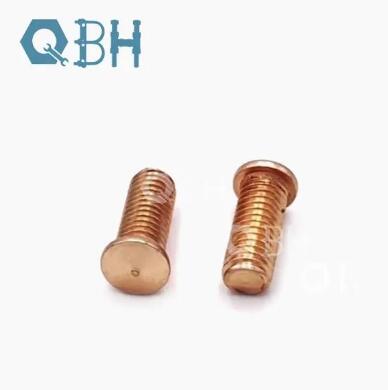Understanding the DIN32501 Brass Welding Stud: Applications and Benefits
2024-09-04
In the world of industrial manufacturing and construction, fasteners play a crucial role in ensuring the structural integrity and reliability of various assemblies. Among the different types of fasteners, the DIN32501 Brass Welding Stud stands out for its unique properties and versatility. In this blog, we will explore what the DIN32501 Brass Welding Stud is, its benefits, and its key applications across various industries.
What is a DIN32501 Brass Welding Stud?
The DIN32501 Brass Welding Stud is a specialized fastener designed for use in applications requiring both mechanical strength and electrical conductivity. It adheres to the DIN (Deutsches Institut für Normung) standard 32501, which specifies the dimensions, material properties, and performance criteria for welding studs made from brass.
Brass, an alloy of copper and zinc, is chosen for its excellent electrical conductivity, corrosion resistance, and ease of welding. The stud is typically designed with a threaded or non-threaded end that is welded directly onto a metal surface, creating a secure and permanent bond.
Benefits of DIN32501 Brass Welding Studs
1. Excellent Electrical Conductivity
One of the primary advantages of brass is its excellent electrical conductivity. This makes DIN32501 Brass Welding Studs ideal for use in electrical and electronic applications where a reliable conductive path is required.
2. Corrosion Resistance
Brass is highly resistant to corrosion, especially from water and various chemicals. This property makes these welding studs suitable for use in environments where exposure to moisture or corrosive substances is a concern.
3. Durability and Strength
Despite being relatively lightweight, brass offers a good balance of strength and durability. This makes DIN32501 Brass Welding Studs capable of withstanding mechanical stresses without deforming or breaking, ensuring the longevity of the assembly.
4. Ease of Installation
The welding process for DIN32501 Brass Welding Studs is straightforward and efficient, allowing for quick and secure installation. Once welded, the stud forms a strong bond with the base material, eliminating the need for additional fasteners or adhesives.
5. Versatility
These welding studs are versatile and can be used in a wide range of applications, from electrical connections to structural assemblies. Their ability to provide both mechanical and electrical connections makes them a valuable component in various industries.
Applications of DIN32501 Brass Welding Studs
1. Electrical and Electronic Equipment
Due to their excellent electrical conductivity, DIN32501 Brass Welding Studs are commonly used in electrical panels, circuit boards, and other electronic devices. They provide a reliable connection point for wiring and components, ensuring efficient current flow.
2. Automotive Industry
In the automotive sector, these welding studs are used in various components, such as battery terminals, grounding points, and sensor connections. Their corrosion resistance and durability make them ideal for use in the harsh environments typically encountered in vehicles.
3. HVAC Systems
Heating, ventilation, and air conditioning (HVAC) systems often require reliable electrical connections for sensors, motors, and control units. DIN32501 Brass Welding Studs are used to create these connections, ensuring the proper functioning of the system.
4. Construction and Building Materials
In construction, these welding studs are used in applications that require both structural support and electrical grounding, such as in steel frameworks, scaffolding, and building facades.
5. Marine and Offshore Applications
The corrosion resistance of brass makes DIN32501 Brass Welding Studs suitable for use in marine and offshore environments. They are commonly used in shipbuilding, oil rigs, and other structures exposed to saltwater and harsh conditions.
Conclusion
The DIN32501 Brass Welding Stud is a versatile and reliable fastener that offers a range of benefits, from excellent electrical conductivity to corrosion resistance and ease of installation. Its applications span multiple industries, making it a crucial component in both electrical and structural assemblies. Whether you’re working on an automotive project, an HVAC system, or a marine application, understanding the advantages of these welding studs can help you choose the right fastener for your needs.



